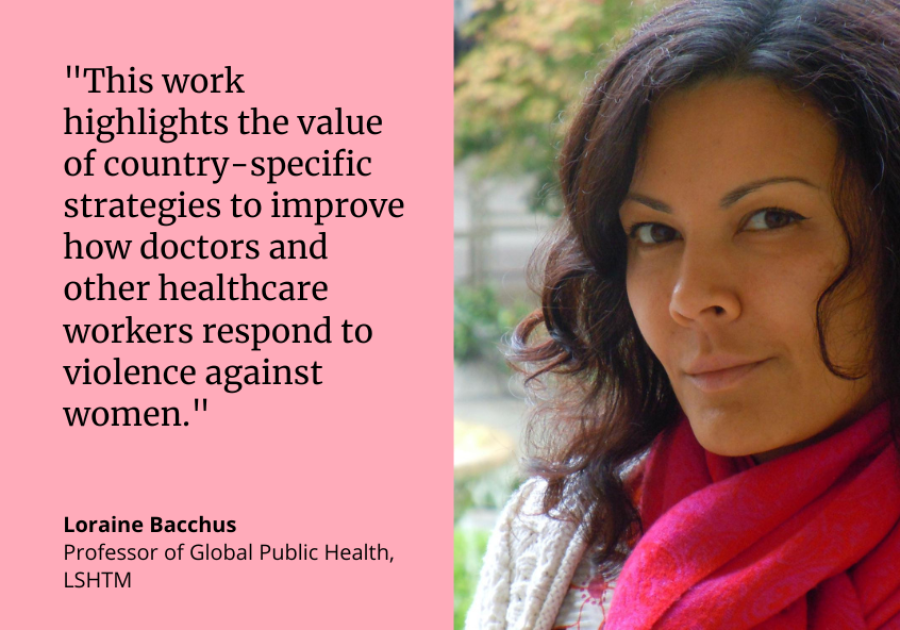Intervention improves healthcare response to domestic violence in low- and middle-income countries
27 November 2024 London School of Hygiene & Tropical Medicine London School of Hygiene & Tropical Medicine https://lshtm.ac.uk/themes/custom/lshtm/images/lshtm-logo-black.png
Culturally appropriate women-centred interventions can help healthcare systems respond to domestic violence, research by the Healthcare Responding to Violence and Abuse (HERA) group has found.
This National Institute for Health and Care Research (NIHR) Global Research Group will report their findings and publish a PolicyBristol report at a conference in London today, 27 November, as part of 16 days of activism against gender based violence. The report will outline HERA-developed domestic violence and abuse (DVA) healthcare interventions for low- and middle-income countries.
The HERA Group was co-led by the University of Bristol and London School of Hygiene & Tropical Medicine. Specific country studies were led by the University of Sao Paulo (Brazil), Kathmandu University (Nepal), An-Najah National University (occupied Palestinian territories), and University of Peradeniya (Sri Lanka).
Domestic violence and abuse (DVA) against women is a significant concern in each of these countries, with a prevalence of 23% in Brazil, 27% in Nepal, 29% in the occupied Palestinian territories (oPt), and 24% in Sri Lanka.
Following the implementation of the HERA intervention, rates of identification of DVA in participating health services increased by 78% in Brazil, 100% in Nepal and 69% in Sri Lanka. Only the occupied Palestinian territories reported a 24% decreased in DVA identification, partly due to escalating violence in the Israeli occupation.
Healthcare workers’ confidence and motivation to address domestic violence also improved generally as they reported increases in their readiness to identify, inquire about and respond to domestic violence by documenting cases, making referrals, and offering ongoing support.
Within Nepal, a slight decrease in healthcare worker confidence to offer ongoing support was reported due to healthcare clinics becoming Covid isolation wards.
HERA aimed to strengthen each country’s health system response to DVA by focusing on women-centred care, context-specific adaptations, and healthcare leadership to drive change. The HERA intervention developed several key elements, which were adapted to each country’s context, including: training focused on enhancing understanding of women’s experiences; improving recording practices; and establishing care pathways for affected women within and beyond the health system.
Research took place in health services serving socioeconomically disadvantaged communities, focusing on sexual and reproductive health care. This included primary healthcare facilities in Brazil, Nepal, and the oPt, as well as in district general hospitals in Sri Lanka.
The report will make numerous policy and practice recommendations to further strengthen healthcare system responses to domestic violence and abuse, and address gaps in the research evidence.
Loraine Bacchus, Professor of Global Public Health at LSHTM and co-Director of HERA, said: “HERA has shown that culturally appropriate, women-centred programmes can strengthen healthcare system responses to domestic violence.
“By collaborating with local health services and addressing the specific challenges faced by their local communities, it is possible to improve healthcare worker confidence and build trust with the women they support.
“This work highlights the value of country-specific strategies to improve how doctors and other healthcare workers respond to violence against women.”
Manuela Colombini, Associate Professor in Health Systems and Policy, and Co-Director of the Gender Violence and Health Centre at LSHTM, said: “As we observe the 16 Days of activism against gender based violence, HERA’s findings emphasise the potential for health systems to drive meaningful change in addressing domestic violence. By investing in training, leadership, and tailored care, we can ensure women receive the support they deserve.”
Gene Feder, Professor of Primary Care in the Centre for Academic Primary Care at the University of Bristol and co-Director of HERA, said: “Violence against women is a severe violation of human rights rooted in gender and economic inequalities, affecting nearly one in three women globally. The rates are even higher in some low- and middle-income countries.
“Health systems play a crucial role in addressing the immediate health needs of women and supporting their pathways to safety and recovery.
In HERA we found that health systems in diverse countries in the global South could be strengthened to identify and respond to the needs of women experiencing domestic violence.”
About HERA and the research
HERA (Healthcare Responding to Violence and Abuse) is a National Institute for Health and Care Research (NIHR) Global Research Group that aimed to strengthen the health system response to domestic violence and abuse in Brazil, Nepal, the occupied Palestinian Territories, and Sri Lanka.
This research was funded by the NIHR using UK aid from the UK Government to support global health research. The views expressed in the publication are those of the authors and not necessarily those of the NIHR or the UK Government.
PolicyBristol report
‘Health system interventions can improve domestic violence support but context matters’ by Loraine J Bacchus, Manuela Colombini (London School of Hygiene & Tropical Medicine), Stephanie Pereira, Ana Flavia d’Oliveira, Lilia Blima Schraiber (University of São Paulo), Poonam Rishal, Kunta Pun (Kathmandu University), Thilini Rajapakse (University of Peradeniya), Amira Shaheen, Abdulsalam Alkaiyat (An-Najah National University), Claudia Garcia Moreno (World Health Organization), Gene Feder (University of Bristol), HERA team. Published by PolicyBristol. November 2024.
This news story is based on an original press release from the University of Bristol.
If you enjoyed this article and would like to build a career in global health, we offer a range of MSc programmes covering health and data, infectious and tropical diseases, population health, and public health and policy.
Available on campus or online, including flexible study that works around your work and home life, be part of a global community at the UK's no.1 public health university.